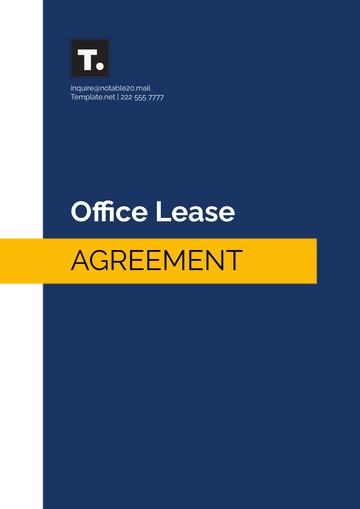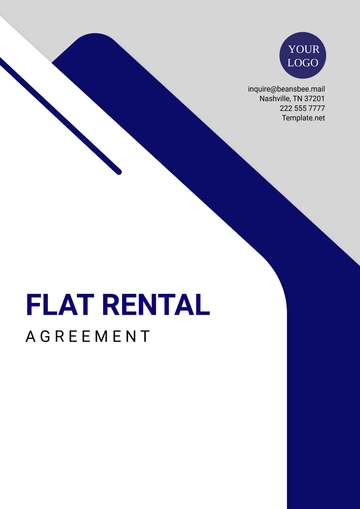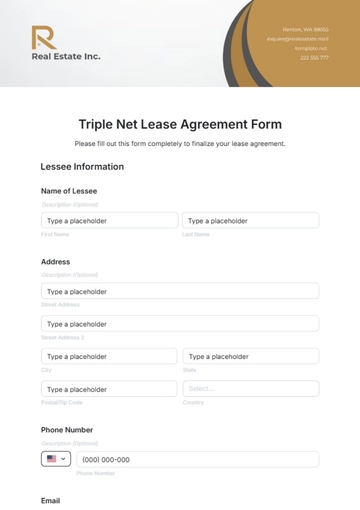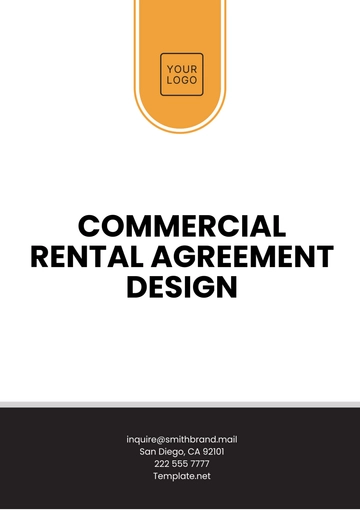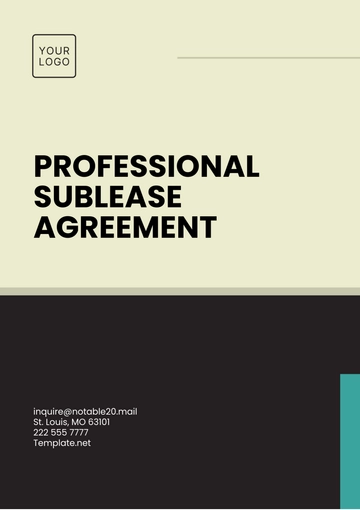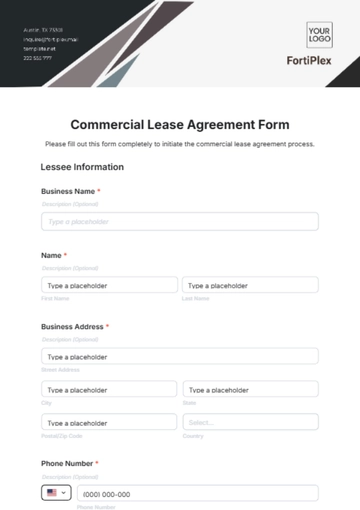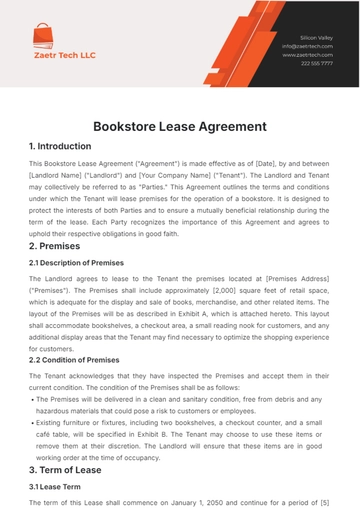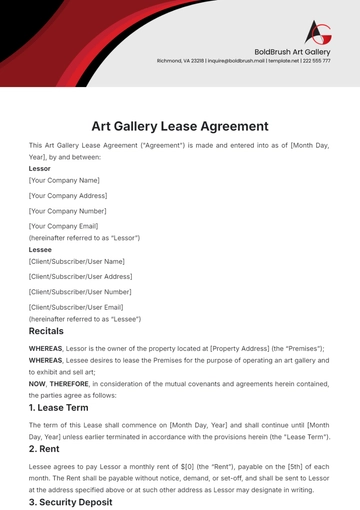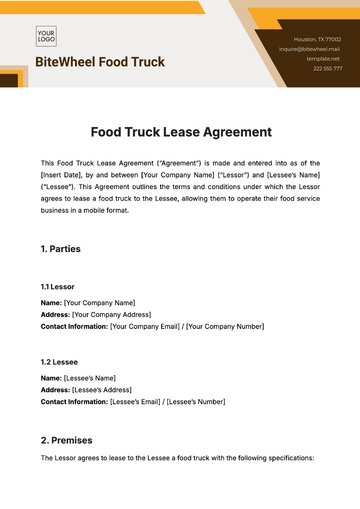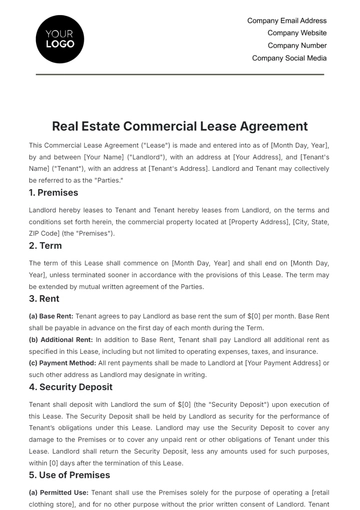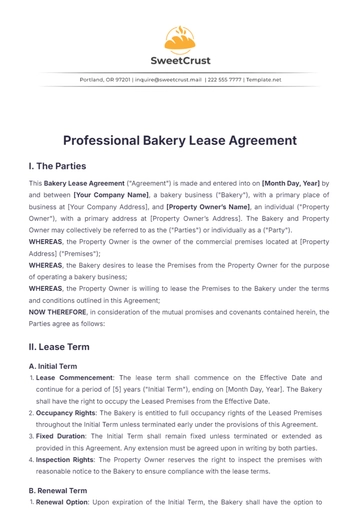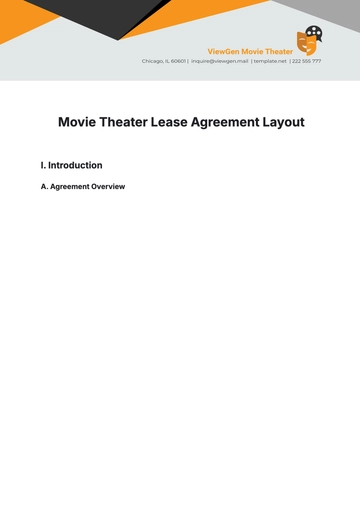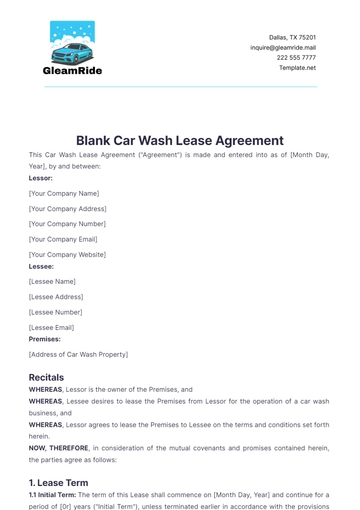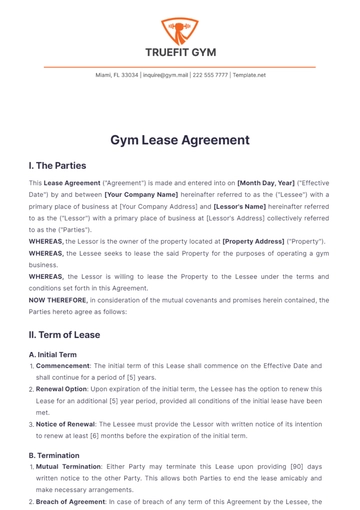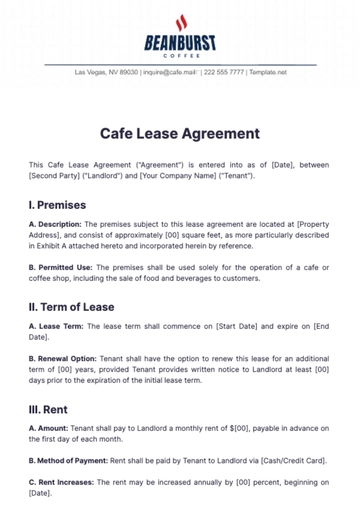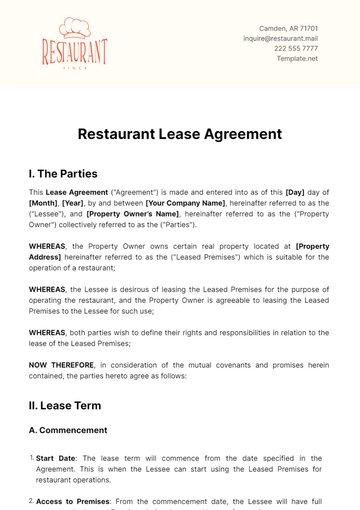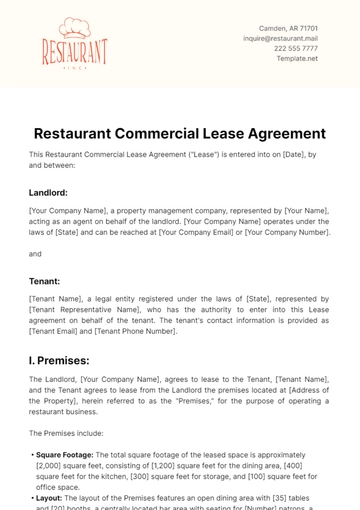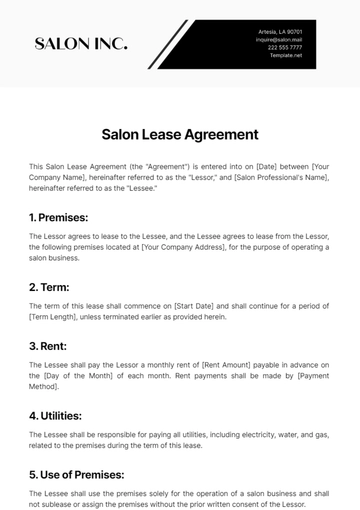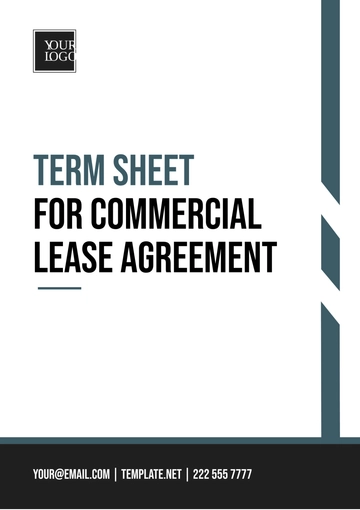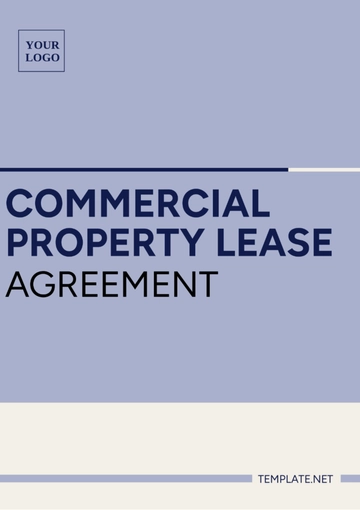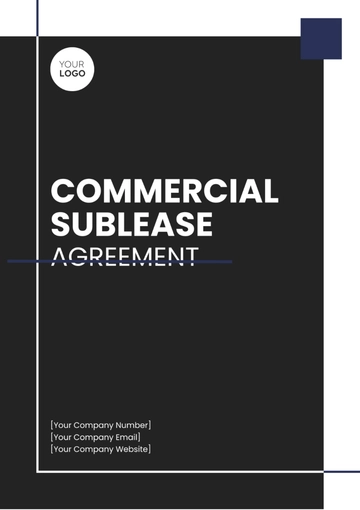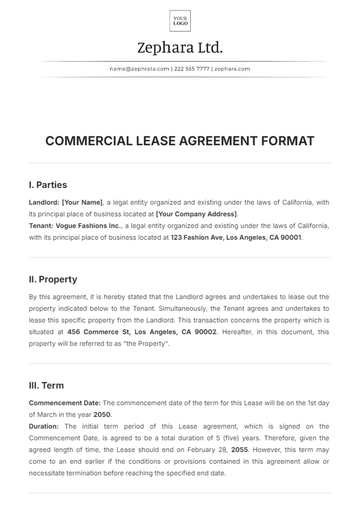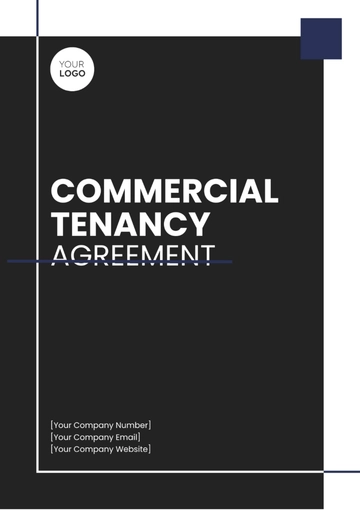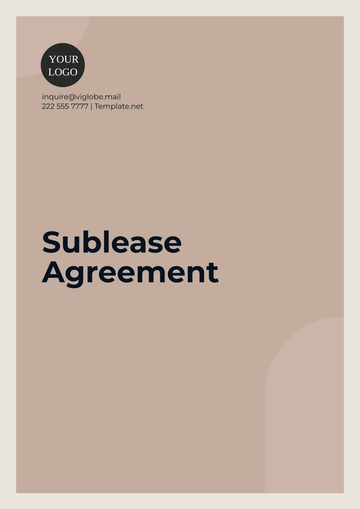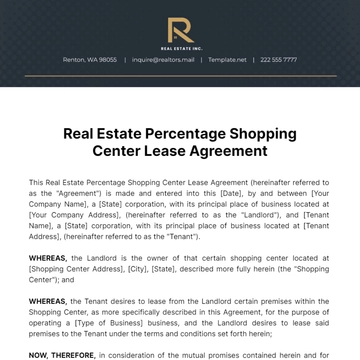Free Restaurant Lease Agreement
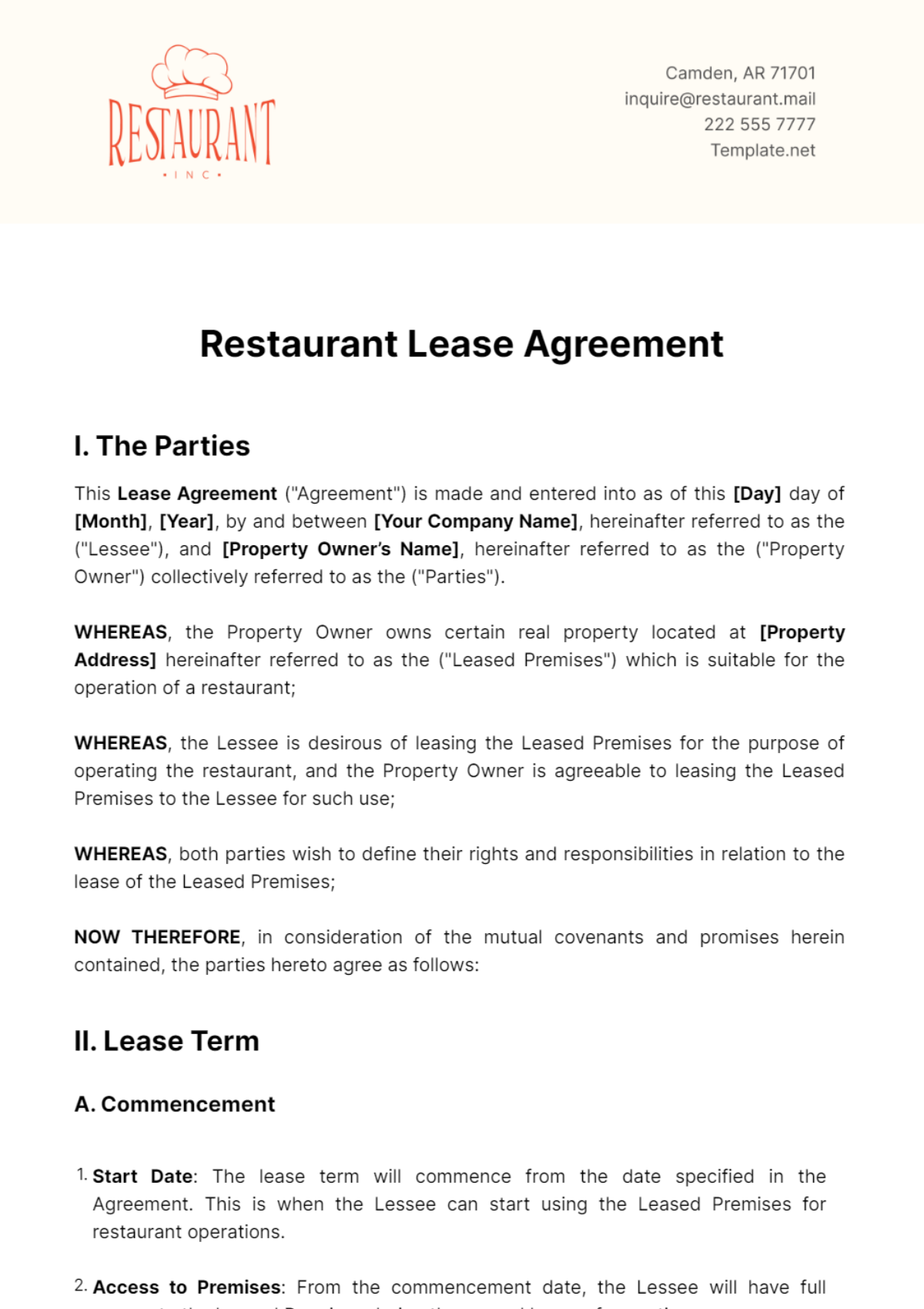
I. The Parties
This Lease Agreement ("Agreement") is made and entered into as of this [Day] day of [Month], [Year], by and between [Your Company Name], hereinafter referred to as the ("Lessee"), and [Property Owner’s Name], hereinafter referred to as the ("Property Owner") collectively referred to as the ("Parties").
WHEREAS, the Property Owner owns certain real property located at [Property Address] hereinafter referred to as the ("Leased Premises") which is suitable for the operation of a restaurant;
WHEREAS, the Lessee is desirous of leasing the Leased Premises for the purpose of operating the restaurant, and the Property Owner is agreeable to leasing the Leased Premises to the Lessee for such use;
WHEREAS, both parties wish to define their rights and responsibilities in relation to the lease of the Leased Premises;
NOW THEREFORE, in consideration of the mutual covenants and promises herein contained, the parties hereto agree as follows:
II. Lease Term
A. Commencement
Start Date: The lease term will commence from the date specified in the Agreement. This is when the Lessee can start using the Leased Premises for restaurant operations.
Access to Premises: From the commencement date, the Lessee will have full access to the Leased Premises during the agreed hours of operation.
Preparation for Opening: The Lessee will be responsible for any preparations required for the opening of the restaurant, such as setting up equipment and decorating the premises.
B. Lease Duration
Lease Period: The lease will continue for a period of [3] years. This provides stability for the Lessee’s restaurant operations.
Expiry Date: The lease will expire on [Month Day, Year] unless terminated earlier. This is when the Lessee’s right to use the Leased Premises ends.
Early Termination: The lease may be terminated earlier in accordance with the terms of this Agreement. This could be due to a breach of the Agreement or other specified circumstances.
C. Lease Renewal
Option to Renew: The parties may mutually agree to renew the lease for an additional term. This allows the Lessee to continue operating the restaurant at the Leased Premises.
Renewal Terms: The terms and conditions for the renewal will be agreed upon at that time. This could include changes to the rent or other terms of the lease.
Renewal Process: The process for renewing the lease will be set out in the Agreement. This will include any notice requirements and the timeline for the renewal process.
III. Rent
A. Rent Amount
Monthly Rent: The Lessee agrees to pay a monthly rent of [$5,000]. This amount has been agreed upon based on the location, size, and other features of the Leased Premises.
Payment Due Date: The rent is due and payable on or before the [1st] day of each calendar month. This ensures that the Property Owner receives the rent in a timely manner.
Initial Payment: The initial rent payment will be due on [Month Day, Year]. This is when the Lessee’s obligation to pay rent begins.
B. Late Payment
Payment Obligation: The Lessee is obligated to make all rent payments when due. This is essential for the Lessee’s continued use of the Leased Premises.
Late Charge: If the Lessee fails to make any rent payment when due, a late charge equal to [3.5]% of the overdue amount will apply. This encourages timely payment and compensates the Property Owner for the delay.
Non-payment Consequences: Continued non-payment of rent could lead to termination of the lease and legal action to recover the unpaid rent.
IV. Security Deposit
A. Deposit Amount
Security Deposit: Upon signing this Agreement, the Lessee will provide a security deposit of [$10,000]. This deposit acts as a financial guarantee for the Lessee’s obligations under the Agreement.
Use of Deposit: The Property Owner may use the security deposit to cover any unpaid rent or damages beyond normal wear and tear. This protects the Property Owner’s financial interests.
Non-Usage of Deposit: The security deposit cannot be used for regular rent payments. It is strictly a security measure.
B. Return of Deposit
Return Timeframe: The Property Owner will return the security deposit within [30] days after the lease ends. This gives the Property Owner time to assess any potential damages.
Deductions: The Property Owner may deduct from the security deposit any amounts needed to cover unpaid rent or damages beyond normal wear and tear. The Lessee will be provided with an itemized list of any deductions.
Disputes: If there is a dispute over the return or deductions from the security deposit, the parties agree to follow the dispute resolution process outlined in this Agreement.
V. Use of Leased Premises
A. Purpose of Use
Restaurant Operations: The Lessee will use the Leased Premises exclusively for operating a restaurant. This includes all activities related to preparing and serving food and beverages.
Compliance with Laws: The Lessee will comply with all laws, ordinances, regulations, and requirements applicable to restaurant operations. This includes food safety regulations, health codes, and business licensing requirements.
Prohibited Uses: The Lessee will not use the Leased Premises for any illegal activities. This protects the reputation and legal standing of both the Lessee and the Property Owner.
B. Respect for Surroundings
Noise Control: The Lessee will operate the restaurant in a manner that does not disrupt the peace and quiet of the surrounding area. This includes controlling noise levels, especially during late hours.
Waste Management: The Lessee will properly dispose of all waste generated by the restaurant. This includes following all regulations for the disposal of food waste and other restaurant-related waste.
Neighbor Relations: The Lessee will maintain good relations with neighboring businesses and residents. This includes addressing any concerns they may have about the restaurant’s operations.
VI. Maintenance and Repairs
A. Property Owner’s Responsibilities
Structural Maintenance: The Property Owner will maintain the structural integrity of the Leased Premises. This includes the roof, foundation, and exterior walls, ensuring the premises remain safe and usable.
Major Repairs: The Property Owner will be responsible for any major repairs that are not due to the Lessee’s negligence or willful misconduct. This includes repairs to the building’s structure and any systems such as plumbing or electrical that are included in the lease.
Inspections: The Property Owner may conduct regular inspections to ensure the structural integrity of the Leased Premises. Any necessary repairs identified during these inspections will be carried out by the Property Owner.
B. Lessee’s Responsibilities
Interior Maintenance: The Lessee will maintain the interior of the Leased Premises in good condition. This includes regular cleaning, minor repairs, and maintenance of fixtures and fittings.
System Maintenance: The Lessee will maintain any systems within the Leased Premises, such as electrical, plumbing, and HVAC systems. This ensures these systems remain in good working order for the operation of the restaurant.
Damage Repair: If any damage to the Leased Premises is caused by the Lessee’s negligence or willful misconduct, the Lessee will be responsible for the repairs. This includes any damage to the interior of the premises or to any systems included in the lease.
VII. Utilities
A. Utility Services
Responsibility for Utilities: The Lessee will be responsible for all utilities associated with the Leased Premises. This includes electricity, gas, water, sewer, and trash removal, ensuring the restaurant has the necessary services to operate.
Utility Costs: The Lessee will bear all costs associated with these utilities. This includes usage charges, connection fees, and any other costs imposed by the utility providers.
Service Interruptions: The Lessee will be responsible for dealing with any interruptions to utility services. This includes contacting the relevant utility providers and arranging for any necessary repairs or maintenance.
B. Utility Accounts
Account Transfer: Upon commencement of the lease term, the Lessee will transfer all utility accounts into its name. This ensures the Lessee is billed directly for utility usage.
Proof of Transfer: The Lessee will provide proof of the account transfer to the Property Owner upon request. This confirms that the Lessee has taken responsibility for the utility accounts.
Account Management: The Lessee will manage the utility accounts throughout the lease term. This includes ensuring bills are paid on time and dealing with any issues or queries from the utility providers.
VIII. Insurance
A. Commercial General Liability Insurance
Coverage Amount: The Lessee will maintain commercial general liability insurance with a minimum coverage of [$1,000,000] per occurrence. This protects against claims for bodily injury and property damage that may arise from the Lessee’s operations.
Additional Insured: The Property Owner will be named as an additional insured on the policy. This provides protection for the Property Owner in case of a claim related to the Lessee’s operations.
Proof of Insurance: The Lessee will provide proof of this insurance to the Property Owner before the lease begins and upon each renewal.
B. Property Insurance
Coverage: The Lessee will obtain and maintain property insurance. This covers the Lessee’s personal property and any leasehold improvements made to the Leased Premises.
Replacement Cost: The insurance will cover the replacement cost of the insured property. This ensures that the Lessee can replace or repair the property in case of a covered loss.
Proof of Insurance: The Lessee will provide proof of this insurance to the Property Owner before the lease begins and upon each renewal.
IX. Indemnification
A. Indemnity Obligation
Scope of Indemnity: The Lessee will indemnify the Property Owner against all claims, actions, damages, liabilities, and expenses arising from the Lessee’s use of the Leased Premises. This includes claims for personal injury, property damage, and other losses.
Defense Obligation: The Lessee will defend the Property Owner against any such claims. This includes hiring legal counsel and handling all aspects of the defense.
Reimbursement: The Lessee will reimburse the Property Owner for any reasonable attorneys’ fees and other costs incurred in defending against such claims.
B. Breach of Agreement
Indemnity for Breach: The Lessee will also indemnify the Property Owner for any claims or losses arising from a breach or default by the Lessee under this Agreement. This includes any costs incurred by the Property Owner as a result of the breach.
Notice of Breach: The Property Owner will provide the Lessee with notice of any such breach and an opportunity to cure, if applicable.
Remedies: If the Lessee fails to cure the breach, the Property Owner may pursue all available remedies, including termination of the lease and recovery of damages.
X. Default and Remedies
A. Default by Lessee
Conditions for Default: A default occurs if the Lessee fails to pay rent or breaches any other term, covenant, or condition of this Agreement. This includes failure to maintain insurance, causing damage to the Leased Premises, or violating any laws or regulations.
Notice of Default: If a default occurs, the Property Owner will provide written notice to the Lessee. This notice will describe the nature of the default and the steps required to cure it.
Cure Period: The Lessee will have [30] days from the receipt of the notice to cure the default. This gives the Lessee an opportunity to rectify the situation and avoid termination of the lease.
B. Remedies for Default
Termination of Lease: If the default is not cured within the [30]-day period, the Property Owner may terminate the lease. This ends the Lessee’s right to occupy the Leased Premises.
Possession of Leased Premises: Upon termination of the lease, the Property Owner may re-enter and take possession of the Leased Premises. The Property Owner may then lease the premises to another tenant.
Legal Remedies: The Property Owner may also pursue any other remedies available at law or in equity. This could include suing for unpaid rent or damages caused by the Lessee’s breach.
XI. Signatures
IN WITNESS WHEREOF, the parties hereto have executed this Agreement as of the day and year first above written.
Lessee

[Authorized Representative Name]
[Your Company Name]
Date: [Month Day, Year]
Property Owner

[Property Owner's Name]
Date: [Month Day, Year]
- 100% Customizable, free editor
- Access 1 Million+ Templates, photo’s & graphics
- Download or share as a template
- Click and replace photos, graphics, text, backgrounds
- Resize, crop, AI write & more
- Access advanced editor
Secure your leasing arrangements effortlessly with the Restaurant Lease Agreement Template from Template.net! This editable document provides a customizable structure to cover all necessary terms and conditions. With the AI Editor Tool, you can craft a detailed and professional agreement that meets all legal requirements and ensures a smooth relationship!
You may also like
- Lease Agreement
- Non Compete Agreement
- Rental Agreement
- Prenuptial Agreement
- Non Disclosure Agreement
- Operating Agreement
- Hold Harmless Agreement
- LLC Operating Agreement
- Arbitration Agreement
- Purchase Agreement
- Residential Lease Agreement
- Executive Agreement
- Confidentiality Agreement
- Contractor Agreement
- Partnership Agreement
- Postnuptial Agreement
- Collective Bargaining Agreement
- Loan Agreement
- Roommate Agreement
- Commercial Lease Agreement
- Separation Agreement
- Cohabitation Agreement
- Room Rental Agreement
- Child Custody Agreement
- Employee Agreement
- License Agreements
- Settlement Agreement
- Joint Venture Agreement
- Indemnity Agreement
- Subordination Agreement
- Sales Agreement
- Agreements Between Two Parties
- Business Agreement
- Real Estate Agreement
- HR Agreement
- Service Agreement
- Property Agreement
- Agreement Letter
- Restaurant Agreement
- Construction Agreement
- Finance Agreement
- Marketing Agreement
- Payment Agreement
- Investment Agreement
- Management Agreement
- Nonprofit Agreement
- Software Agreement
- Startup Agreement
- Agency Agreement
- Copyright Agreement
- Collaboration Agreement
- Reseller Agreement
- Car Rental Agreement
- Cleaning Services Agreement
- Consultant Agreement
- Deed Agreement
- Car Agreement
- Equipment Agreement
- Shares Agreement
- Data Sharing Agreement
- Advertising Agreement
- School Agreement
- Franchise Agreement
- Event Agreement
- Travel Agency Agreement
- Vehicle Agreement
- Board Resolution Agreement
- Land Agreement
- Binding Agreement
- Tenancy Agreement
- Exclusive Agreement
- Development Agreement
- Assignment Agreement
- Design Agreement
- Equity Agreement
- Mortgage Agreement
- Purchase and Sale Agreement
- Shareholder Agreement
- Vendor Agreement
- Royalty Agreement
- Vehicle Lease Agreement
- Hotel Agreement
- Tenant Agreement
- Artist Agreement
- Commission Agreement
- Consignment Agreement
- Debt Agreement
- Recruitment Agreement
- Training Agreement
- Transfer Agreement
- Apprenticeship Agreement
- IT and Software Agreement
- Referral Agreement
- Resolution Agreement
- Waiver Agreement
- Consent Agreement
- Partner Agreement
- Social Media Agreement
- Customer Agreement
- Credit Agreement
- Supply Agreement
- Agent Agreement
- Brand Agreement
- Law Firm Agreement
- Maintenance Agreement
- Mutual Agreement
- Retail Agreement
- Deposit Agreement
- Land Purchase Agreement
- Nursing Home Agreement
- Supplier Agreement
- Buy Sell Agreement
- Child Support Agreement
- Landlord Agreement
- Payment Plan Agreement
- Release Agreement
- Research Agreement
- Sponsorship Agreement
- Buyout Agreement
- Equipment Rental Agreement
- Farm Agreement
- Manufacturing Agreement
- Strategic Agreement
- Termination of Lease Agreement
- Compliance Agreement
- Family Agreement
- Interior Design Agreement
- Ownership Agreement
- Residential Lease Agreement
- Retainer Agreement
- Trade Agreement
- University Agreement
- Broker Agreement
- Dissolution Agreement
- Funding Agreement
- Hosting Agreement
- Investor Agreement
- Memorandum of Agreement
- Advisory Agreement
- Affiliate Agreement
- Freelancer Agreement
- Grant Agreement
- Master Service Agreement
- Parking Agreement
- Subscription Agreement
- Trust Agreement
- Cancellation Agreement
- Horse Agreement
- Influencer Agreement
- Membership Agreement
- Vacation Rental Agreement
- Wholesale Agreement
- Author Agreement
- Distributor Agreement
- Exchange Agreement
- Food Agreement
- Guarantee Agreement
- Installment Agreement
- Internship Agreement
- Music Agreement
- Severance Agreement
- Software Development Agreement
- Storage Agreement
- Facility Agreement
- Intercompany Agreement
- Lending Agreement
- Lodger Agreement
- Outsourcing Services Agreement
- Usage Agreement
- Assurance Agreement
- Photography Agreement
- Profit Sharing Agreement
- Relationship Agreement
- Rent To Own Agreement
- Repayment Agreement
- Volunteer Agreement
- Co Parenting Agreement
- HVAC Agreement
- Lawn Care Agreement
- SAAS Agreement
- Work from Home Agreement
- Coaching Agreement
- Protection Agreement
- Security Agreement
- Repair Agreement
- Agreements License
